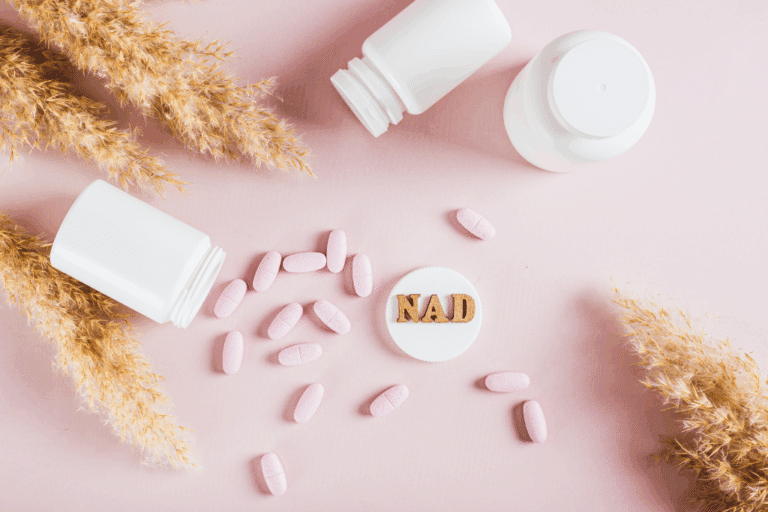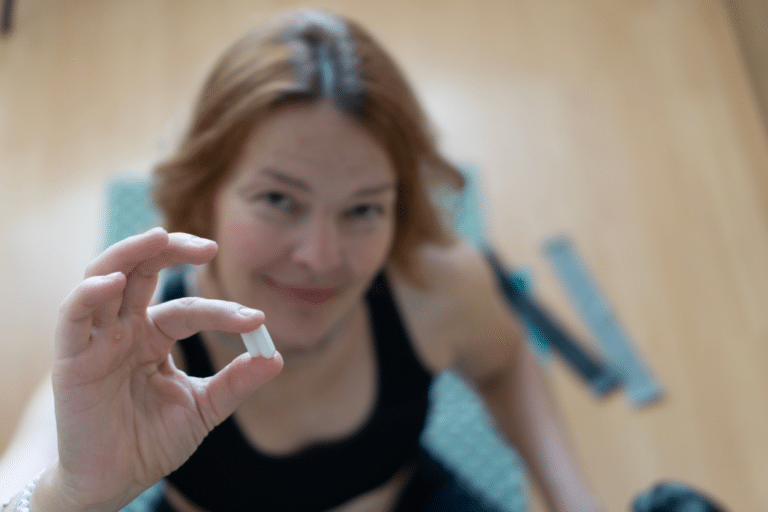What Are NAD and NMN?
NAD, short for nicotinamide adenine dinucleotide, is a coenzyme in every cell. It’s essential for turning food into energy, repairing DNA, and regulating metabolism. NAD levels naturally decline with age, contributing to fatigue, slower recovery, and increased susceptibility to disease.
NMN, or nicotinamide mononucleotide, is a precursor to NAD. It helps the body make NAD more efficiently. Think of NAD as the battery that powers your cells, and NMN as the charger that keeps those batteries full.
The idea is simple: if you can maintain NAD levels, you support the cellular processes that keep you strong, clear-headed, and resilient as you age.
Why Take One Over the Other?
Here’s where things get practical. Both NAD and NMN aim to achieve the same goal—raising NAD levels—but the path they take and how your body uses them differ.
1. Absorption and Conversion
Oral NAD supplements have limited absorption because NAD molecules are too large to easily pass through cell membranes. This is why NAD is often administered intravenously in clinical settings. NMN, on the other hand, is small enough to be absorbed and then converted into NAD inside the cells, making it more effective for everyday use.
2. Evidence in Human Studies
Recent research supports NMN’s ability to raise NAD levels in blood and potentially improve real-world functions such as walking speed, endurance, and sleep in older adults. Evidence for oral NAD is more limited, with most studies relying on intravenous infusions that are costly and inconvenient.
3. Cost and Accessibility
NAD infusions can cost hundreds to thousands of dollars per month and are typically available only in clinics. NMN supplements are widely available, taken orally, and have consistent dosing data in clinical trials.
4. Practical Longevity Use
For most people building a personal longevity plan, NMN is the more practical and evidence-based option. It can be taken daily, has good safety data, and integrates easily into an overall healthspan strategy. NAD infusions may have a role in specialized clinical cases, but they’re not necessary for most people.
What the Latest Human Studies Show
Several human trials published after 2023 offer more insight into how NMN and NAD precursors work in real life:
- A 12-week study in older adults found that NMN raised blood NAD, maintained walking speed, and improved sleep quality compared with placebo.
- A double-blind trial confirmed a clear dose-response relationship between NMN intake and NAD levels.
- A crossover study showed that a systems-based supplement targeting multiple NAD pathways increased NAD in healthy adults.
- New clinical trials are underway examining how NAD precursors affect vascular and cognitive function in aging adults.
The overall takeaway: NMN consistently raises NAD levels in human trials and may offer small but measurable improvements in energy and function.
Potential Benefits
Maintaining NAD levels may:
- Support mitochondrial energy production
- Enhance endurance and recovery
- Improve sleep quality
- Help regulate metabolism and lipid levels
- Protect cellular health and DNA integrity
Early evidence also suggests possible benefits for brain and vascular health. While these effects are promising, they represent healthy aging support—not a guarantee of longer lifespan.

Want to create a custom longevity health plan?
You’re in the right place.
I can help you with a functional approach to midlife women’s health including hormone balance, gut health, autoimmune issues, bone health, heart health and more!
Possible Adverse Effects and Caveats
Most short-term NMN studies report excellent safety and tolerability, but long-term data are still limited. Some meta-analyses show minor increases in blood glucose in certain individuals.
Because NAD supports both healthy and abnormal cell growth, those with a history of cancer should consult their healthcare provider before supplementing. Product quality is critical, so always choose brands that provide third-party testing and transparency.
In 2025, the FDA formally recognized NMN as a lawful dietary supplement ingredient, which should improve oversight and consumer confidence.
How NAD and NMN Fit Into a Longevity Plan
Supplements can help, but the foundation of longevity still rests on the basics:
- Consistent exercise, especially resistance and cardio training
- A nutrient-rich diet with sufficient protein and fiber
- Quality sleep and recovery
- Stress management and community connection
These lifestyle habits naturally support NAD production. Once those are solid, NMN can be added as a targeted tool for mitochondrial and cellular health.
Most studies use between 250–900 mg of NMN daily, typically taken in the morning. Start low, monitor how you feel, and check labs like fasting glucose, lipids, and inflammatory markers to evaluate your response.
Who Might Benefit Most
- Midlife and older adults experiencing fatigue or slower recovery
- Highly active individuals looking for better mitochondrial support
- People addressing metabolic issues like insulin resistance or elevated triglycerides
Younger, healthy adults may notice less dramatic effects, and resources may be better spent on training, recovery, and nutrition optimization first.
Dosing and Stacking
Start with 250–500 mg daily, increasing gradually if tolerated. Morning dosing aligns best with energy needs. NMN pairs well with creatine, omega-3s, magnesium, and a high-protein diet.
If you’re using time-restricted eating, take NMN with your first meal. Those taking metformin or GLP-1 medications should check with their clinician due to potential interactions affecting mitochondrial pathways.
When to Skip It
Avoid NMN if you are pregnant or breastfeeding. People with cancer or autoimmune diseases should discuss supplementation with their medical team. If your sleep, training, or diet aren’t yet consistent, focus there first—those are the biggest drivers of longevity.
Bottom Line
NAD is essential for energy, repair, and resilience. Its decline contributes to many age-related changes. NMN is currently the most practical, well-studied, and accessible way to support NAD levels safely at home.
Think of NMN as a supportive tool, not a substitute for the fundamentals. When layered on a strong foundation of exercise, nutrition, sleep, and mindset, it may help you stay stronger and more energetic for decades to come.
References
- Morifuji, M., et al. (2024). Ingestion of β-nicotinamide mononucleotide increased blood NAD+ levels, maintained walking speed, and improved sleep quality in older adults. Geroscience, 46, 1981-1996.
- Kuerec, A. H., et al. (2024). Nicotinamide adenine dinucleotide concentration changes in a randomized, double-blind trial of NMN supplementation. Experimental Gerontology, 192, 112406.
- Henderson, J. D., et al. (2024). The use of a systems approach to increase NAD+ in humans. NPJ Systems Biology and Applications, 10, 11.
- Iqbal, T., et al. (2024). The therapeutic perspective of NAD+ precursors in age-related disorders. Biochimica et Biophysica Acta, 1879, 130599.
- ClinicalTrials.gov. (Ongoing). The NADage Study: Nicotinamide riboside replenishment in frailty. NCT06208527.
- ClinicalTrials.gov. (Ongoing). Tracing the metabolic flux of orally administered NAD+ precursors in younger and older adults. NCT06882096.
- Szarvas, Z., et al. (2025). Effects of oral nicotinamide riboside on age-related vascular and cognitive decline. Journal of Pharmacology and Experimental Therapeutics. Advance online publication.
- Liao, G., et al. (2024). Advancements in NMN biotherapy and research updates in healthy aging. Journal of Translational Medicine, 22, 438.
- FDA. (2025, September 29). Letters confirming NMN is a lawful dietary supplement ingredient. Venable LLP.
- NutraIngredients USA. (2025, September 30). FDA declares NMN lawful in dietary supplements.
Dr. Anna Garrett is a menopause expert and Doctor of Pharmacy. She helps women who are struggling with symptoms of perimenopause and menopause find natural hormone balancing solutions so they can rock their mojo through midlife and beyond. Dr. Anna is the author of Perimenopause: The Savvy Sister’s Guide to Hormone Harmony. Order your copy at www.perimenopausebook.com.
Dr. Anna is available for 1-1 consultations. Find out more at www.drannagarrett.com/lets-




